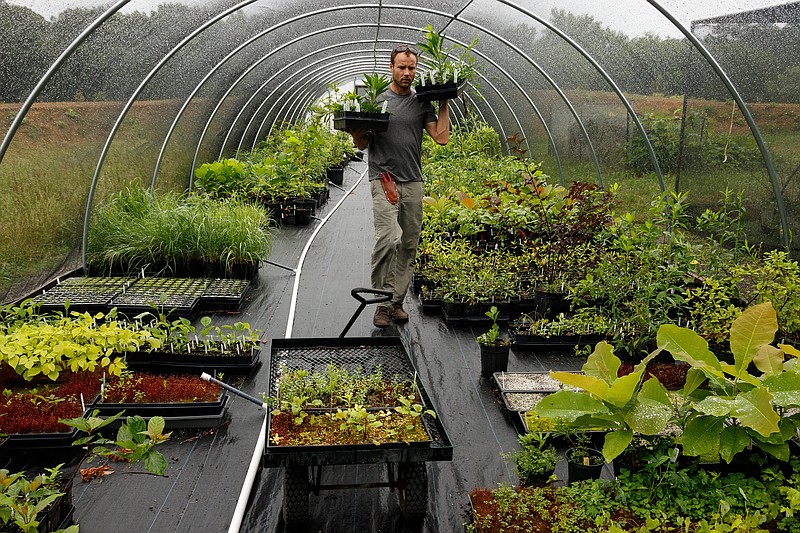Over the past half-century, Chattanooga went from being labeled by the federal government as "the dirtiest city" in America to being named "best town ever" by Outside magazine.
But the city's environmental turnaround is far from complete, and a new community-wide plan is needed to address the challenges of dealing with climate change and building a sustainable community, according to a coalition of environmental, community and business leaders who have drafted a plan for the incoming mayor and city council to consider for Chattanooga's future.
"We want to create a stronger and more resilient Chattanooga for all people, and that will require all of us - government, businesses, neighborhoods, nonprofits and individuals," said Michael Walton, executive director of green/spaces, the nonprofit Chattanooga environmental agency that coordinated the development of the community plan.
A draft of the Integrated Community Sustainability Plan was unveiled Wednesday and has already been endorsed, at least in part, by nine of the 15 candidates running to become Chattanooga's next mayor, including all of the top-spending frontrunners in the race.
Over the past two years, nearly 175 community activists, academic leaders, neighborhood organizers, health care officials and nonprofit leaders met to help define how to make Chattanooga a cleaner, greener and more equitable city.
(Find out more about the study at www.greenspaceschattanooga.org/icsp-2021)
Looking at best practices around the globe and Chattanooga's unique local issues, the proposed plan sets a goal of eliminating most wastes and all human contamination into local waterways by 2035 and achieving carbon neutrality by 2050. It seeks to make Chattanooga both an anti-extinction community that preserves endangered plants and a "frictionless transit" town that provides cleaner and more accessible mobility options.
"It's obvious that we should be doing this, and we just need to create an action plan and put this in the forefront of what we want to do and become as a community," said Tyler Forrest, vice chancellor for finance and administration at the University of Tennessee at Chattanooga.
To achieve its sweeping goals, Walton said both voluntary and mandated policies will be needed to help narrow the city's income and racial disparities and to improve energy efficiency, waste recycling and transportation systems.
"City government will have a key role to play in implementing these changes, but it's bigger than just city hall, and we really need an 'all-hands-on-deck' approach if we're going to achieve these aspirational goals," Walton said.
Leaders of six committees created to help write the plan recommended creating government-backed green banks to invest in clean businesses and land banks to use vacant or foreclosed parcels to create more affordable housing. The study also suggests Chattanooga establish one-stop-shop health and food facilities in low-income neighborhoods and offer free public transit services to those in need to help provide cleaner and better transportation options.
Integrated Community Sustainability Plan goals
* Achieve zero waste by 2035* Community-wide carbon neutral by 2050* Eliminate human contamination in local waterways* Create “frictionless transit” that offers cheaper and better mobility* Become an anti-extinction community focused on native regeneration and support equitable food production and distribution* Make Chattanooga a sustainable and resilient community for all.
"This is a planning process that involves everyone and its intent is to help everyone," said Marvene Noel, a representative of the Orchard Knob Neighborhood Association who helped draft one of the committee proposals.
Walton said low-income neighborhoods around the country are disproportionately being hit hardest by climate change, including flooding and tornadoes in Chattanooga. Solving environmental challenges also will require effort to build a more equitable community, he said.
The plan is still being finalized and its authors hope that the city of Chattanooga - and perhaps Hamilton County and other municipalities in the region - will adopt the suggestions as a roadmap for their futures.
The recommended changes will require major and, in some cases, costly changes in energy, transportation and waste systems. But backers of the plan said such improvements are needed and will create opportunities for new types of growth and improved health for local residents.
"Having a city that sets these kinds of goals is where I want to live," said Ali Ahmed, founder of Green Strategies LLC, who moved to Chattanooga after starting his energy consulting firm in Northeast Ohio. "It's key to me to be in a community that resonates with what my business does."
Ahmed said solving the waste, pollution and inequality problems in Chattanooga is both a huge economic challenge and a big business opportunity.
In their 45-page draft plan, the authors of the Integrated Community Sustainability Plan highlight how Chattanooga improved both its environment and economy over the past generation. The report highlights how Chattanooga has shown its ability to adapt from an old-line manufacturing-based economy and grow as a national leader in urban redevelopment and building a digital economy.
"From one of the first reinvestments in an urban waterfront to massive investments in the country's most advanced smart grid and then ensuring that those communication services are available to all students, Chattanooga has demonstrated that no ideal is too small for our collective attention to accomplish," the report said.
The new plan would update a similar but more focused climate-action plan that was adopted in 2009 based on the recommendations of the Chattanooga Green Committee. More than 90% of the suggestions in that plan have been adopted, and citywide carbon emissions have been cut by 25% while Chattanooga's population grew 14% and the city's GDP expanded by 45%.
"This kind of integrated plan can make our whole community much more resilient and sustainable for the long term," said Mark McKnight, president of Reflection Riding Arboretum and Nature Center.
Contact Dave Flessner at dflessner@timesfreepress.com or 423-757-6340.
